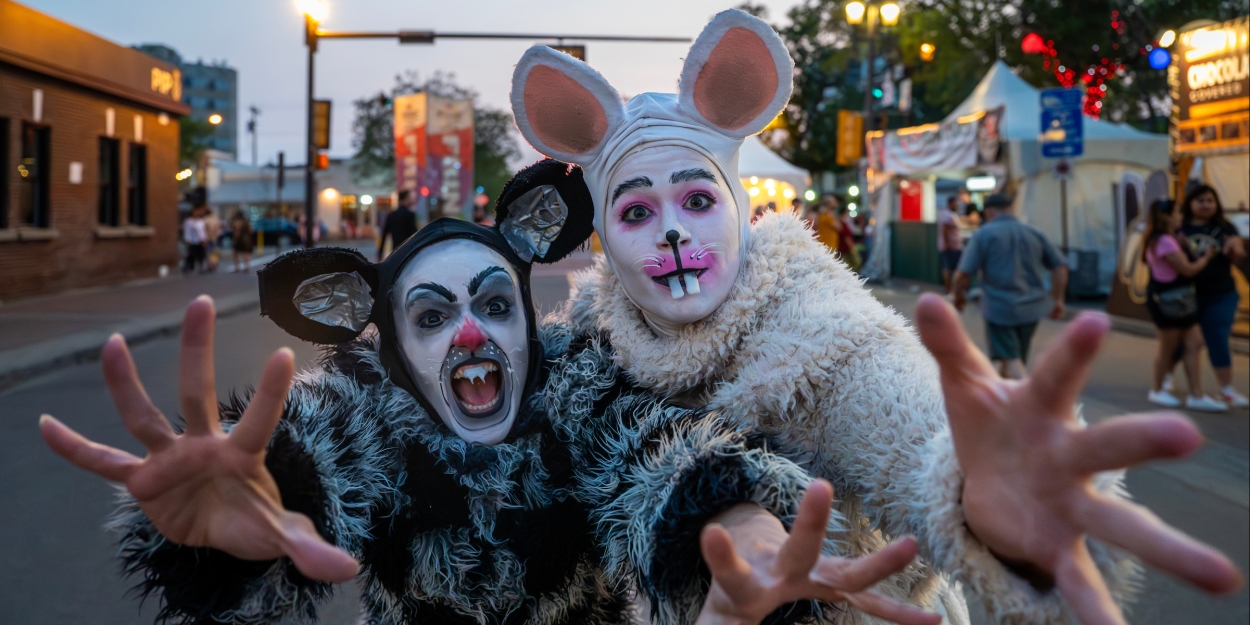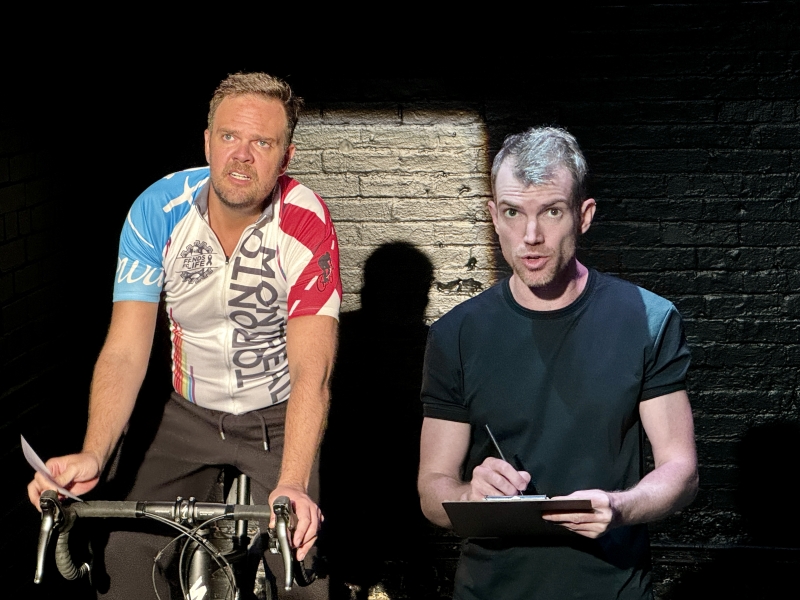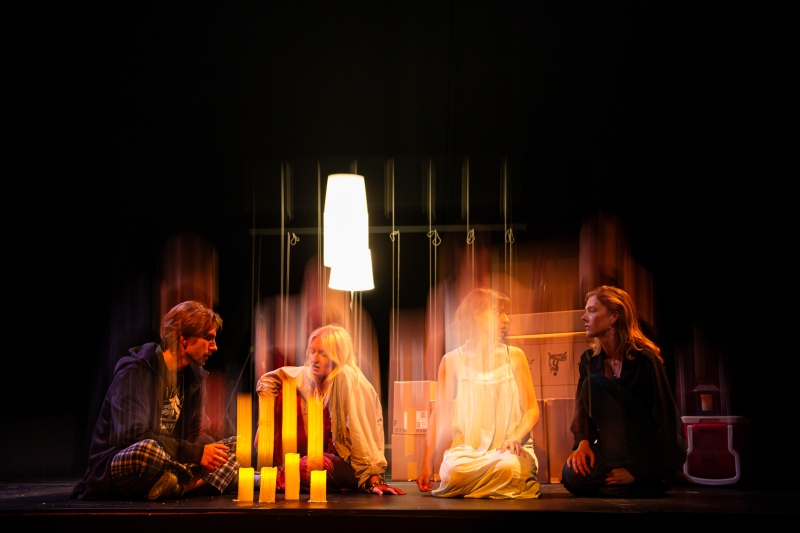Review: TORONTO FRINGE FESTIVAL: DAY 5
Reviews of Rat Academy, Poz, The Bluffs, and 1 Santosh Santosh 2 Go


RAT ACADEMY
A cross between Fringe mainstays Morro and Jasp (Burrow and Rats?) and Animaniacs characters Pinky and the Brain, RAT ACADEMY is an oddball gem of a Fringe show. Featuring two rat masters of audience interaction trying to survive amidst the Albertan zero-rat initiative, a real policy enacted in the 1950s which has prevented the little critters from gaining a (tiny) foothold in the province, RAT ACADEMY sends the audience to rat school.
The sharp-tongued and sharp-toothed Fingers (Dayna Lea Hoffman) tries to educate the sweet, credulous Shrimp (Katie Yoner) in practices of stealing, hiding, and fighting back. Shrimp, whose ankle tag marks him as a former lab rat, thinks humans aren’t so bad, and just wants to be loved. Oh, and he’d also like some cheese. The performers, wearing sharp teeth and full rat costumes with impressive face paint (designed by Meegan Sweet), speak in slightly garbled (but understandable) rat voices. The set by Claire Sonmor effectively replicates a back alley, playing with scale; some items are normal-sized, while others help make the rats seem small. Fingers’ hunched, suspicious physicality balances well with Shrimp’s more louche sprawling.
The delightful interplay between Fingers and Shrimp regularly spills over into the audience, which is pulled into every scene at ranging levels of participation. At my performance, the audience interaction was so fortuitous that it was hard to believe it was improv—but really, it just spoke to the performers’ skill at working the crowd and reacting to their behaviour (much like rat-testing scientists). RAT ACADEMY is one of the more a-mouse-ing shows I’ve seen so far this Fringe. It’s all silliness and lunacy, but its point still stands: why do we kill creatures, just because we can? Highly recommended.
Photo of Dayna Lea Hoffman and Katie Yoner by Marc Chalifoux
POZ

The winner of the Fringe’s New Play Contest, Mark Keller’s POZ is a spellbinding act of storytelling. Keller’s unexpected HIV diagnosis changed his life in an instant, making him a pariah in some circles and an object of curiosity in others. Though with (expensive) medication, his viral load quickly became undetectable, he found it nearly impossible to successfully navigate dating while positive. Quickly learning who his real friends were, he found it harder and harder to rely on others for support—but also found it’s hard to rely on yourself when your own body commits the ultimate betrayal.
The well-crafted play deals with a difficult subject with honesty and humour. It’s cognizant of the theatre about HIV that has come before, containing a couple of sly references to plays like Angels in America, but is also completely its own. Though it could have sold many more tickets in a larger venue (the run is already sold out), the intimacy of the Backspace is a bonus, allowing the personable Keller to make arresting eye contact as he tells his story. He’s accompanied by Alan Shonfield, who effectively slips into a multitude of multifaceted roles as everyone else in Keller’s life, and Amber Pilon, who appears in a small but crucial fantasy role. Nick May’s direction and Sofia Di Cicco’s lighting design make it easy to understand time and place with only a couple of chairs and a stationary bicycle.
Perhaps the most impressive aspect of POZ is how it uses the theatrical medium to sensitively explore the challenges of a manageable but chronic illness, not only in terms of how it impacts one’s physical life, but how it impacts the concept of the narrative of one’s life. Comparing HIV to the effort of a yearly weeklong bike ride from Toronto to Montreal, an effective framing device that helps shape the otherwise chronological narrative, Keller muses about the nature of the illness as a marathon rather than a sprint. It’s a difficulty not to be triumphantly overcome, but to be quietly, maturely and permanently handled, with the knowledge that many will come with you for the sprint, but not the marathon. As a person who deals with a chronic illness myself, I found it a sharp, meaningful metaphor in the midst of an already meaningful and moving play. I hope the show is remounted for longer in a larger space, so that more than 385 people can see it.
Photo of Mark Keller and Alan Shonfeld provided by the company
THE BLUFFS

Creating genuine creepy Gothic horror on stage, particularly within the constraints of the Fringe Festival, is no easy task, but Sarini Kumarasinghe’s THE BLUFFS contains some genuine chills and thrills in its ghost story about grief, revenge, and letting go set in a dilapidated family cabin.
The cabin is Eleanor’s (Shelayna Christante) inheritance. She’s the widow of Lorie, a woman who’s described by even those who loved her as sucking up all the energy in a room. When she returns months after Lorie’s death to tie up loose ends and sell the cabin, she finds Lorie’s brother Jordan (Malcolm Green) living there, laying claim to the building that’s been in his family since he helped build it years ago. Rage at how Lorie treated them both mingles with grief as they both try to lay the past to rest, but there’s a presence that seems unwilling to let anyone move on.
In generating unsettling feelings, it helps that Kumarasinghe’s script is played completely seriously, occasionally using realistic humour but never undercutting itself with camp. Committing to the seemingly improbable story does wonders, allowing us to suspend our disbelief and enjoy the tension. Also helpful is Jackie Sirois’ direction of the show’s simple but effective tech, including flickering lights (Vishmayaa Jeyamoorthy) and a box-filled set (Mike Sirois) that’s easily disrupted. The cabin’s “walls,” made of what look like baggage carts strung with ropes, making them seem both solid and diaphanous and allowing spirits to pass through.
There’s some lacking clarity in the timeline that doesn’t make sense, perhaps because of the actors’ youth (is it an old family property, or built by Jordan as a young adult? If the latter, he doesn’t seem old enough to have developed a true long-term attachment to the place). As well, Green could match the committed energy of the other three actors; in particular, Eleanor is listening to a grief podcast, and Justine Christensen has the “podcast” cadence and voice down pat, while also managing to be imperiously menacing later on. That being said, there’s a lot to enjoy here as the script unpacks the relationships between the reluctant siblings-in-law, the woman that united them, and the cabin’s mysterious buyer (Cydney Watson).
Photo of Malcolm Green, Cydney Watson, Shelayna Christante, and Justine Christensen provided by the company
1 SANTOSH SANTOSH 2 GO: TOSH FINDS HIS GROOVE

A late entry into the Fringe, Srutika Sabu’s 1 SANTOSH SANTOSH 2 GO is a charming, outsized drag show about defining failure and success for oneself that nearly bursts the seams of the Passe Muraille Backspace with energy. Santosh is a decent man with a decent IT job, but one that pales in his parents’ eyes in comparison to his neurosurgeon sisters. In his 40s, with a permanent nervous grin and visible sheen of sweat, he measures his success (or lack thereof) on a makeshift board, gyrating awkwardly for the audience. An announcer (Mahdi Mozafari, who’s equally funny when he’s delivering voiceover or onstage with a recurring gag of rushing the audience) narrates Santosh’s life as though we’ve stumbled onto a nature documentary about the single Indian-Canadian man.
Directed by Fringe veteran Ken Hall, the show is in constant motion, and Santosh’s relatable struggles and pathetic demeanour make him a sympathetic and entertaining character. One scene, where he eats a very Canadian food in a way its inventor probably would never have dreamed, had the audience screaming with laughter (and probably some secondhand horror). While the actual point of the show takes some time to get started, Sabu’s underdog portrayal is immediately winning. As he grows in confidence, you hope he wins all of his battles. Some creative low-budget stage magic elevates a slightly chaotic ending.
Photo of Srutika Sabu by Fatma Ozbek
Reader Reviews
Videos

